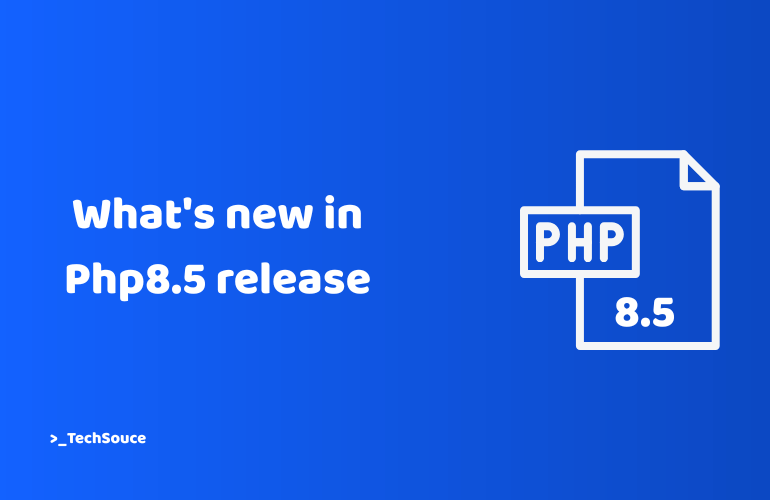PHP 8.5 brings powerful features, making your web development workflow smarter and more efficient. The release includes the new pipe operator, advanced cloning, better error tracking, and streamlined array handling. You get actionable upgrades designed for modern projects. This guide explores everything new in PHP 8.5 with practical explanations and some humor. Ready to optimize your stack for speed and clarity? Let’s jump in.
The Pipe Operator: Transform Your Code
Have you ever written a function call so nested you wondered if your code was a cryptic puzzle set by a former developer? PHP 8.5 says goodbye to deep nests and hello to streamlined data flow. The pipe operator allows you to direct output through functions smoothly.
Before PHP 8.5:
$input = ' Some kind of string. ';
$output = strtolower(str_replace(['.', '/', '…'], '', str_replace(' ', '-', trim($input))));
After PHP 8.5:
$output = $input
|> trim(...)
|> (fn (string $string) => str_replace(' ', '-', $string))
|> (fn (string $string) => str_replace(['.', '/', '…'], '', $string))
|> strtolower(...);
You take code with layers like onion skins and flatten it into something legible. Working late? The pipe operator is your new sidekick.

Clone With: Smarter Object Cloning
Cloning objects with changes feels less like black magic and more like clear, logical work now. The new clone with assignment lets you copy objects while changing values, no extra boilerplate required.
Example:
final class Book {
public function __construct(public string $title, public string $description) {}
public function withTitle(string $title): self {
return clone($this, ['title' => $title]);
}
}
No more cryptic copy-paste hacks. You clone, update, and carry on. You do need public(set) for readonly properties, so keep that in mind when resetting write access.
NoDiscard Attribute and (void) Cast
Ever write a function, return a precious result, and watch it ignored? Now, stop bad habits before your code gets too lax. The #[NoDiscard] attribute warns you if a return value is not used.
Example:
#[NoDiscard("Return value required.")]
function foo(): string { return 'hi'; }
foo(); // Warning
$string = foo(); // No warning
You can suppress the warning by explicitly casting to void.
(void) foo();
PHP encourages better usage and tracking, helping you avoid hidden bugs from missed returns.
Closure Improvements in PHP 8.5
You now get closures and first-class callables in constant expressions and even in attributes. This expands your toolkit for metaprogramming and annotation.
Example attribute:
#[SkipDiscovery(static function (Container $container): bool {
return !$container->get(Application::class) instanceof ConsoleApplication;
})]
final class BlogPostEventHandlers { /* … */ }
Closures need to be marked static and cannot access external variables. You write concise, adaptive code for your framework or package.
Fatal Error Backtraces: Track Bugs Quicker
Tired of cryptic fatal errors with no clues? PHP 8.5 presents full backtraces for fatal errors. Now, every fatal error yields a stack trace.
Sample output:
Fatal error: Maximum execution time of 1 second exceeded in example.php on line 6
Stack trace:
#0 example.php(6): usleep(100000)
#1 example.php(7): recurse()
You track problems in seconds, not hours. Your debugging turns tedious bug hunts into quick fixes.
Meet array_first() and array_last()
Fetching the first and last items in arrays no longer needs clunky code.
Before PHP 8.5:
$first = $array[array_key_first($array)] ?? null;
Now:
$first = array_first($array);
$last = array_last($array);
You write clearer, shorter code for array access. The API catches up with developer common sense.
Enhanced URI Parsing
Parsing and validating URIs often needed odd custom solutions. PHP 8.5 offers a solid RFC3986 implementation.
Example:
use Uri\Rfc3986\Uri;
$uri = new Uri('https://tempestphp.com/2.x/getting-started/introduction');
$uri->getHost(); // 'tempestphp.com'
$uri->getScheme(); // 'https'
$uri->getPort(); // null or port value
Building RESTful services? You process URLs with confidence and less hassle.
DelayedTargetValidation: Future-Proof Attributes
Sometimes attributes validate now, sometimes they validate at runtime. The new #[DelayedTargetValidation] attribute lets you defer validation, solving backward compatibility headaches.
Example:
class Child extends Base {
#[DelayedTargetValidation]
#[Override]
public const NAME = 'Child';
}
You get flexibility for managing upgrades and legacy support.
Smaller Changes Worth Knowing
- Asymmetric visibility for static properties gives you more control.
- You can attach attributes to compile-time non-class constants.
- Property promotion extends to final properties, refactoring gets easier.
#[Override]applies to properties, not just methods.- Dom\Element now has
$outerHTML. - Exif supports HEIF and HEIC images.
FILTER_THROW_ON_FAILUREflag forfilter_var()offers better error handling.
Each change addresses workflow pain points, streamlining your projects.
Deprecations and Breaking Changes
Change means progress, but also some cleaning up.
- Non-standard cast names like
(boolean)and(integer)are deprecated. Use(bool)and(int)now. - Backtick operators as shell_exec() are deprecated. You lose a shorthand, but code clarity improves.
- Constant redeclaration is deprecated, reducing confusion in larger codebases.
- The
disabled_classesini setting is gone; check your server configs. - Review the official PHP manual for the complete list.
Prepare your codebase. Update old patterns and avoid upgrade headaches.
Final Conclusion
PHP 8.5 lifts barriers, brings better syntax, and encourages clear, error-free code. Adopt the pipe operator for easier chaining. Use clone with to duplicate objects safely. Write closure-powered attributes to keep your application modular.
Upgrade your PHP version. Test new features. Refactor legacy code for clarity and speed. Share your findings with your development team and on forums for greater knowledge.
Source : Official PHP docs
